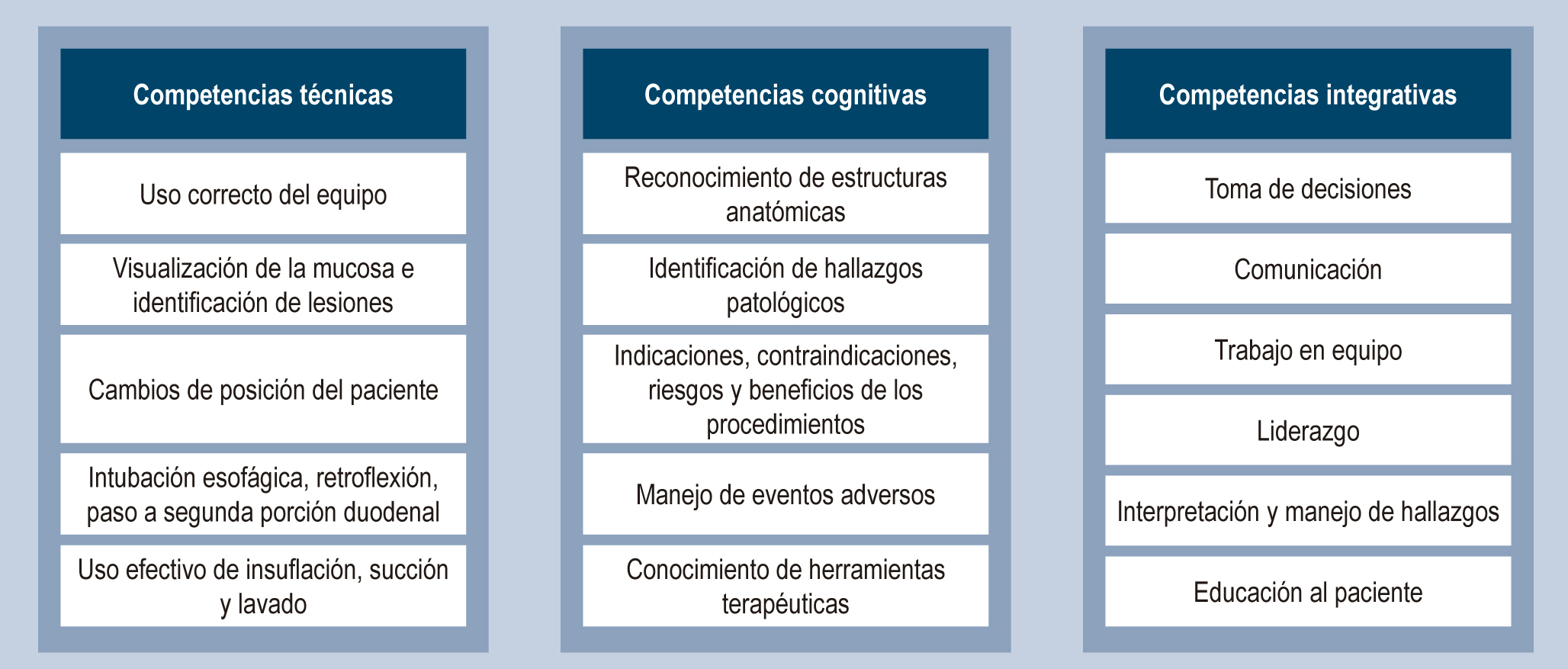Current Approach to Training and Assessing New Generations of Endoscopists
DOI:
https://doi.org/10.22516/25007440.940Keywords:
Esofagogastroduodenoscopia, competencias, aprendizaje, enseñanzaAbstract
Esophagogastroduodenoscopy (EGD) is a diagnostic and therapeutic study for various upper gastrointestinal tract diseases. It is a fundamental part of the education and training fellows receive in gastroenterology programs, focusing on developing skills to perform it safely, effectively, and efficiently and master the technique. Historically, value has been attached to the number of procedures required to acquire skills; there is a discrepancy in the recommendations by scientific societies regarding the “ideal” number to meet the minimum requirements and learn the necessary skills. However, each student has different innate and developed abilities that make this process asymmetric.
Adopting a combined training approach (observation, clinical practice, and simulation) is the best method to learn diagnostic EGD. We are facing a generation with forms of learning different from those traditionally implemented, which implies an ongoing process of training and updating for endoscopists dedicated to teaching.
Downloads
References
González R, Rodríguez A, Buckel E, Hernández C, Tejos R, Parra A, et al. Sistematización de un programa de entrenamiento en endoscopia digestiva alta diagnóstica en ambiente simulado y curvas de aprendizaje en pacientes reales. Gastroenterol Latinoam. 2012;23(4):191-196.
Kim JS, Kim BW. Training in endoscopy: Esophagogastroduodenoscopy. Clin Endosc. 2017;50(4):318-321. https://doi.org/10.5946/ce.2017.096
Rincón R, Puentes G, Vargas, Emura F. Estrategias de enseñanza en endoscopia de vías digestivas. En: Cañadas R, Vargas R, Rincón R, Jaramillo S, Puentes G (editores). Currículo nuclear en endoscopia digestiva. Fundamentos teóricos y propuesta curricular. Bogotá: Panamericana; 2018. p. 47-66.
Forbes N, Mohamed R, Raman M. Learning curve for endoscopy training: Is it all about numbers? Best Pract Res Clin Gastroenterol. 2016;30(3): 349-356. https://doi.org/10.1016/j.bpg.2016.04.003
Taullard, D. Capacitación y certificación. En: Saénz R (editor). Guías para mejorar la calidad de la endoscopia digestiva. Santiago de Chile: Talloni; 2010. p. 20-28.
Soetikno R, Kolb JM, Nguyen-Vu T, Jayasekera C, Bogie R, Yu J, et al. Evolving endoscopy teaching in the era of the millennial trainee. Gastrointest Endosc. 2019;89(5):1056-1062. https://doi.org/10.1016/j.gie.2018.11.027
Harden RM, Crosby J. The good teacher is more than a lecturer - the twelve roles of the teacher. Med Teach. 2000;22(4):334-347.
Han S. Achieving Competence in Endoscopy. ACG Case Reports J. 2019;6(8):e00155. https://doi.org/10.14309/crj.0000000000000155
Walsh CM. In-training gastrointestinal endoscopy competency assessment tools: Types of tools, validation and impact. Best Pract Res Clin Gastroenterol. 2016;30(3):357-374. https://doi.org/10.1016/j.bpg.2016.04.001
Khan R, Scaffidi MA, Grover SC, Gimpaya N, Walsh CM. Simulation in endoscopy: Practical educational strategies to improve learning. World J Gastrointest Endosc. 2019;11(3):209-218. https://doi.org/10.4253/wjge.v11.i3.209
Singh S, Sedlack RE, Cook DA. Effects of simulation-based training in gastrointestinal endoscopy: a systematic review and meta-analysis. Clin Gastroenterol Hepatol. 2014;12(10):1611-1623. https://doi.org/10.1016/j.cgh.2014.01.037
Woods K. Simulators in training for upper gastrointestinal endoscopy. Grastroenterol Hepatol. 2019;15(4):207-209.
Blackburn SC, Griffin SJ. Role of simulation in training the next generation of endoscopists. World J Gastrointest Endosc. 2014:16(6):234-239. https://doi.org/10.4253/wjge.v6.i6.234
Cohen J, Bosworth BP, Chak A, Dunkin BJ, Early DS, Gerson LB, et al. Preservation and incorporation of valuable endoscopic innovations (PIVI) on the use of endoscopy simulators for training and assessing skill. Gastrointest Endosc. 2012;76(3):471-475. https://doi.org/10.1016/j.gie.2012.03.248
Aponte D. Del aprendizaje por imitación al aprendizaje por competencias. En: Cañadas R, Vargas R, Rincón R, Jaramillo S, Puentes G (editores). Currículo nuclear en endoscopia digestiva. Fundamentos teóricos y propuesta curricular. Bogotá: Panamericana; 2018. p. 37-46.

Downloads
Published
How to Cite
Issue
Section
License
Copyright (c) 2024 Revista colombiana de Gastroenterología

This work is licensed under a Creative Commons Attribution-NonCommercial-NoDerivatives 4.0 International License.
Aquellos autores/as que tengan publicaciones con esta revista, aceptan los términos siguientes:
Los autores/as ceden sus derechos de autor y garantizarán a la revista el derecho de primera publicación de su obra, el cuál estará simultáneamente sujeto a la Licencia de reconocimiento de Creative Commons que permite a terceros compartir la obra siempre que se indique su autor y su primera publicación en esta revista.
Los contenidos están protegidos bajo una licencia de Creative Commons Reconocimiento-NoComercial-SinObraDerivada 4.0 Internacional.


| Article metrics | |
|---|---|
| Abstract views | |
| Galley vies | |
| PDF Views | |
| HTML views | |
| Other views | |














